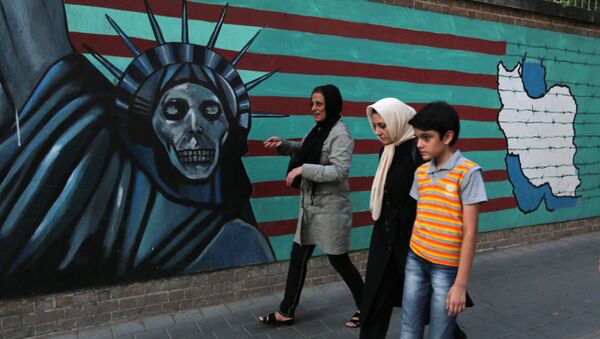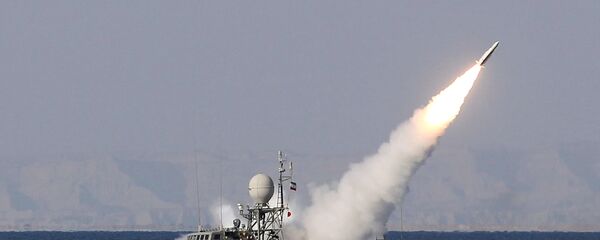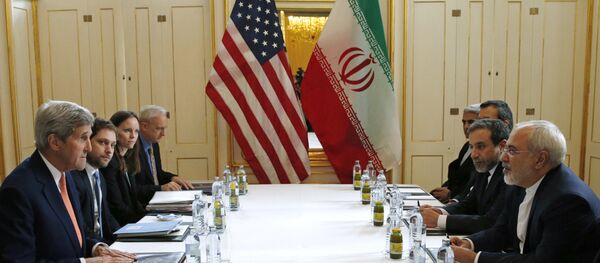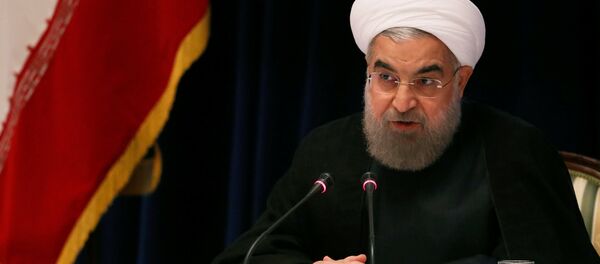The JCPOA, which was clinched in July 2015, lifts nuclear-related sanctions imposed on Iran in exchange for assurances that Tehran's nuclear program will remain peaceful. According to the deal, the sides also agreed to refrain from policies intended to affect Iran's trade and economic relations.
"The Islamic Republic of Iran will honor the JCPOA as long as it enjoys the benefits of the JCPOA," Araghchi was quoted by Tasnim as saying.
The JCPOA, which was agreed upon in July 2015, prompted Russia and other countries to lift nuclear-related sanctions. Araghchi also said that Washington is trying to withdraw from the JCPOA and blame Tehran.
'New US sanctions aimed at making Iran exit nuclear deal' https://t.co/s635d61v2k pic.twitter.com/mNdAHxD1hT
— Press TV (@PressTV) 30 июля 2017 г.
[US President Donald] Trump and the US as a whole are trying to pull out of the nuclear deal while shoving all of the costs of the accord’s failure on Iran," Araghchi was quoted as saying by the Mehr news agency.
During the election campaign and after becoming US president, Trump repeatedly promised to review the Iran nuclear deal and slammed the administration of former US President Barack Obama for signing the agreement in the first place.
Russian expert on the Middle East Irina Fyodorova recalled that the Iranian nuclear deal was not approved by the Congress and was enacted by decree of former US President Obama, making it only valid for 180 days.
"At the end of this period, the US needed either to extend the deal or withdraw from it. Trump extended it for another 180 days. In this regard, stern rhetoric and real actions related to this agreement differ from each other in American politics," Fyodorova told RT.
Iran has condemned US sanctions on a nuclear deal as “hostile, reprehensible and unacceptable” https://t.co/tYjSSnCFSE pic.twitter.com/ePuxgh04dR
— The Times of London (@thetimes) 29 июля 2017 г.
She recalled that apart from the US and Iran, the JCPOA involves Russia, Britain, France, Germany and China. Washington's unilateral withdrawal from the deal would not only surprised Moscow and Beijing, but would also complicate the White House's relations with its NATO allies.
"If the US withdraws from the JCPOA without consulting its allies, it will undermine US credibility among Europeans," Fyodorova said.
Iran vows to continue missile programme, denouncing new US sanctions as "an effort to weaken the nuclear deal" https://t.co/n1oKwPpmD0 pic.twitter.com/gtIT2WS2XE
— Al Jazeera English (@AJEnglish) 29 июля 2017 г.
She added that "European countries need to quickly restore their positions in Iran which is why they are up in arms against any abolition of the agreement on the Iran nuclear program."
"In this regard, Iran is also very unwilling to withdraw from this agreement because if it does so, its hopes for obtaining high-tech investments from European countries would be undermined," Fyodorova pointed out.
#Iran #News #Us Two Years after Nuclear Deal, #Iran Seeking Regional Dominance https://t.co/yKfL7kq2DT pic.twitter.com/sApDJ0mcxs
— iraneAzad — FreeIran (@irane_Azad) 29 июля 2017 г.
She was echoed by Russian Oriental expert Said Gafurov, who said in an interview with RT that "we should not take this [Araghchi's] statement as a preparation for withdrawing from the agreement."
"Iran always has such an opportunity, but it really does not want to spend money on the nuclear missile program, because this is a vulnerable, expensive and very dangerous thing in Iran, which has repeatedly been hit by earthquakes," Gafurov said, adding that Iran "does not really need a nuclear bomb, although technologically they can make it."
Iran warns the fresh sanctions by the US against Iran will harm implementation of the nuclear deal https://t.co/AqmU0EXoln pic.twitter.com/jXPTTUsaah
— China Xinhua News (@XHNews) 26 июля 2017 г.
"We should see this statement as an instrument to use in the domestic political struggle and a leverage to exert pressure on the Americans," Gafurov said. His stance was shared by Fedorova, who said that Iran threatening to withdraw from the "nuclear deal" should not be understood literally.
According to Gafurov, Araghchi's statement was first and foremost addressed to the Israeli lobby in the United States which is mainly responsible for a whole array of the anti-Iranian sanctions endorsed by the US President and Congress.
#Iran #News #Us First New #Iran Regime #Sanctions Since Nuclear Deal Passed https://t.co/tu14mFuOoB pic.twitter.com/9KnPJFWcNP
— iraneAzad — FreeIran (@irane_Azad) 26 июля 2017 г.
Gafurov noted that it is the Israeli lobby that is now pushing for a new package of the anti-Iran sanctions in a bid to damage the interests of the country Israel views as its arch-foe in the region. But their position may change if, as a result of US pressure, Iran decides to begin the production of nuclear weapons, according to Gafurov.
"They are now demanding sanctions against Iran, but if Tehran starts making [nuclear] bombs, they will say: 'Don't introduce the sanctions and let's avoid the bombs," Gafurov said, referring to "a typical Iranian manner of diplomacy aimed at turning the enemy into a friend."
Touching upon the economic aspect of the anti-Iranian sanctions, Gafurov said that these restrictive measures have no effect on the extraction or sale of Iranian oil. He recalled that "Iran is constantly increasing its oil exports while under the sanctions."
Fedorova in turn suggested that "in the future, the United States may slap new sanctions on Iran without withdrawing from the JCPOA."
"The ultimate goal is to drive Iran out of the [global] oil market," Fyodorova said, adding that "this is not a short-term prospect."







